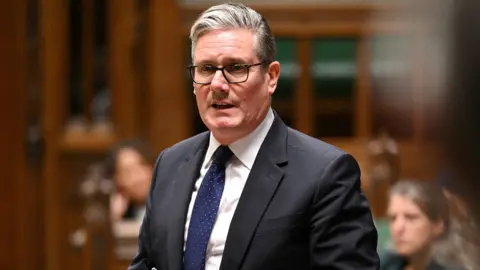PM 'agrees' welfare changes deal with Labour rebels
 Reuters
ReutersThe government is expected to announce a deal shortly with Labour rebels on its planned benefits changes.
Multiple sources tell the BBC existing claimants of the Personal Independence Payment (Pip) will continue to receive what they currently get, as will recipients of the health element of Universal Credit.
It is also expected that the support to help people into employment will be fast forwarded so it happens sooner.
The concessions amount to a massive climbdown from the government, which was staring at the prospect of defeat if it failed to accommodate the demands of over 100 of its backbenchers.
It comes after Sir Keir Starmer spent Thursday making calls to shore up support among the 120 Labour MPs who backed an amendment to stop the government's flagship welfare bill ahead of a Commons vote on Tuesday.
Speaking in the Commons earlier, Sir Keir said he wanted to "see reform implemented with Labour values and fairness".
He said he recognised that MPs of all parties were "eager" to reform the "broken" welfare system.
Broadly speaking the rebels have told the BBC they are happy with the concessions, meaning the bill is now likely to pass.
Peter Lamb, Labour MP for Crawley, posted on social media that he would still not support the bill - calling the changes "insufficient" and accusing ministers of ignoring better options.
The Universal Credit and Personal Independence Payment Bill would change who would qualify for certain disability and sickness benefits.
Ministers had said the legislation, which aims to save £5bn a year by 2030, is crucial to slow down the increase in the number of people claiming benefits.
Chancellor Rachel Reeves had factored these cuts into her Spring Statement in March - designed to help meet her economic plans.
It is unclear how the new reforms will affect the government's spending plans.
Working-age health-related benefit spending has increased from £36bn to £52bn in the five years between 2019 and 2024, according to the Institute for Fiscal Studies (IFS), a think tank.
It is expected to double to £66bn by 2029, without changes to the system.
But Labour MPs have criticised elements of government proposals, including plans to require Pip claimants to prove they need a higher degree of assistance with tasks such as preparing and eating food, communicating, washing and getting dressed.
The Universal Credit and Personal Independence Payment Bill has its second reading on Tuesday, the first opportunity for MPs to support or reject it.
If the legislation clears its first hurdle, it will then face a few hours' examination by all MPs the following week - rather than days or weeks in front of a committee tasked with looking at the Bill.
This is now the third government U-turn in a month, in a major blow to the prime minister's authority.
It follows on from the PM reversing cuts to winter fuel payments, and ordering a grooming gangs inquiry he initially resisted.
The Tories described the concessions understood to have been offered to Labour rebels as "the latest in a growing list of screeching U-turns" from the government.
Shadow chancellor Mel Stride said: "Under pressure from his own MPs Starmer has made another completely unfunded spending commitment."
One of the main co-ordinators behind the welfare amendment, who did not wish to be named, has told the BBC the winter fuel concessions had emboldened many of the rebels this time.
They told the BBC, MPs "all voted for winter fuel [cuts] and have taken so much grief in our constituencies, so colleagues think why should I take that on again?".
It is understood that plans for the amendment began when Work and Pensions Secretary Liz Kendall offered a partial olive branch to rebels by expanding the transition period for anyone losing Pip from four to 13 weeks.

Sign up for our Politics Essential newsletter to keep up with the inner workings of Westminster and beyond.
